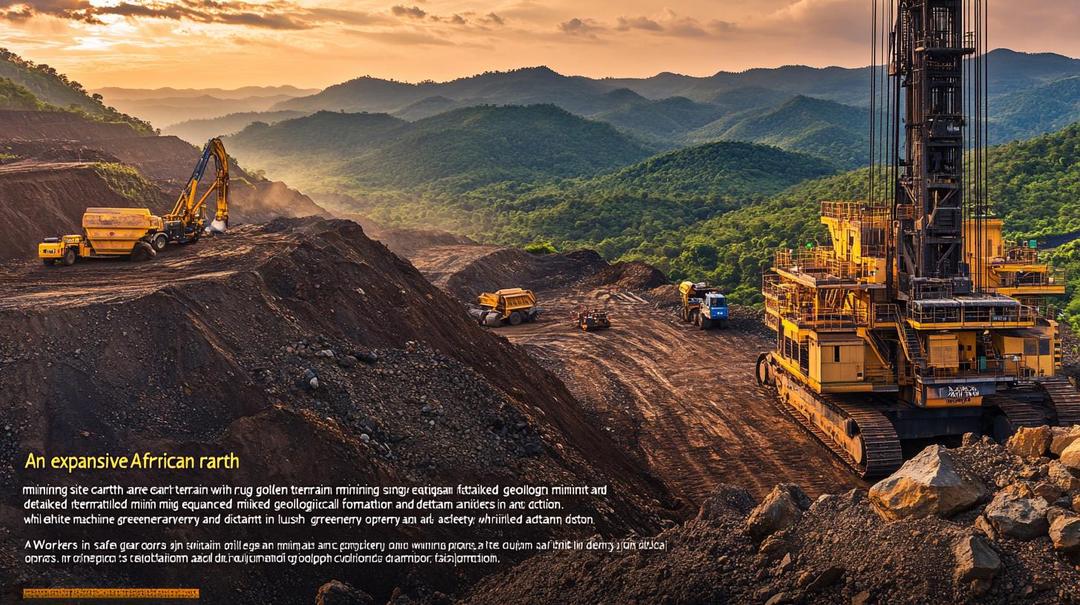Sure, diamonds may be Africa's best friend, but rare earth elements (REEs) are making waves as the continent's untapped potential. China currently produces over 70% of the world's rare earths, but African nations like Burundi and South Africa are angling to shift that balance. What does this mean for the global economy? And what about the environment?
Let's dig in!
Table of Contents
What is Africa Rare Earth Mining, and Why Is It Important?
Rare earth elements (REEs) are a group of 17 metallic elements crucial to modern technology, serving as the backbone of numerous high-tech industries. These elements are essential components in renewable energy systems, advanced electronics, defense technologies, and electric vehicles.
The Critical Nature of Rare Earth Elements
- Fundamental to the manufacturing of powerful magnets
- Enable advanced electronic and communication technologies
- Critical for green energy infrastructure
- Irreplaceable in precision manufacturing and high-performance electronics
Africa is emerging as a significant player in the global rare earth production landscape, particularly as traditional supply chains face increasing disruptions. The continent's vast mineral resources and growing mining capabilities position it as a potential game-changer in the global REE market.
African Countries Leading the Charge in Rare Earth Mining
Several African nations are establishing themselves as key rare earth mining destinations:
Key Producing Countries
- South Africa: Historically strong mining infrastructure
- Burundi: Home to the notable Gakara Rare Earth Project
- Madagascar: Significant geological potential
- Malawi: Emerging rare earth exploration
- Morocco: Developing mineral processing capabilities
- Namibia: Promising rare earth deposits
Notable Mining Projects
- Steenkampskraal mine in South Africa: One of the world's highest-grade rare earth deposits
- Gakara Project in Burundi: Significant rare earth exploration and development
How Does Africa Fit into the Global Rare Earth Supply Chain?
Current Market Dynamics
- China currently dominates global rare earth production (approximately 80% of global supply)
- Africa represents an emerging alternative to the Chinese monopoly
- Growing geopolitical interest in diversifying rare earth sources
Global Demand Projections
- Estimated global rare earth market to reach $18 billion by 2027
- Increasing demand from renewable energy and electric vehicle sectors
- Africa is positioned to capture 10-15% of the global market share by 2030
Economic Opportunities of Rare Earth Mining in Africa
Local Economic Impact
- Job creation in mining and associated industries
- Attraction of foreign direct investment
- Potential for technology transfer and skills development
- Diversification of national economic portfolios
Investment Landscape
- Increasing partnerships with international mining companies
- Australian firms showing significant interest in African rare earth projects
- Potential for downstream processing and value-added manufacturing
Environmental and Ethical Concerns in Africa's Rare Earth Mining
Sustainability Challenges
- High water usage during extraction processes
- Potential environmental degradation
- Land use conflicts with local communities
Ethical Mining Practices
- Growing emphasis on ESG (Environmental, Social, and Governance) compliance
- Development of sustainable extraction technologies
- Community engagement and benefit-sharing models
Opportunities for Investors in Africa's Rare Earth Sector
Investment Considerations
- Untapped geological resources
- Potential for high return on investment
- Geopolitical significance of rare earth production
- Emerging regulatory frameworks
Risk Mitigation Strategies
- Comprehensive geological assessments
- Understanding local regulatory environments
- Long-term partnership approaches
- Technology and infrastructure investments
The Future of Rare Earth Mining in Africa
Technological Advances
- Development of more sustainable extraction methods
- Improved processing technologies
- Integration of digital monitoring and extraction techniques
Global Strategic Implications
- Potential reshaping of global trade networks
- Reduced dependency on single-source rare earth suppliers
- Enhanced technological sovereignty for African nations
Conclusion
Africa's rare earth mining sector is a game-changer for the global economy, ripe with opportunities and challenges. From powering the next wave of green tech to fueling critical industries like defense and electronics, rare earth mining could help Africa cement its role as a major player in the world market. However, it's crucial that key stakeholders prioritize sustainable practices and ethical policies to ensure long-term benefits for both the planet and local communities. Want ongoing updates on Africa's rare earth revolution? Subscribe to our newsletter or check back for more in-depth content!
FAQs
What Are Rare Earth Elements (REEs)?
Rare earth elements are a group of 17 metals critical for high-tech devices like smartphones, batteries, and renewable energy equipment. Despite their name, they're relatively abundant but difficult to extract economically.
Why Is Africa Gaining Attention for Rare Earth Mining?
Africa has significant untapped reserves of REEs and offers a chance for countries to reduce reliance on China, the current global leader in rare earth production.
Which African Countries Are Leading in Rare Earth Mining?
South Africa and Burundi are key leaders, with other active projects in Malawi, Namibia, and Madagascar. More countries are also exploring potential deposits.
What Are the Environmental Risks of Rare Earth Mining?
The process can lead to soil erosion, water contamination, and toxic waste production. These challenges are prompting calls for more sustainable and ethical extraction methods.
Is Rare Earth Mining a Good Investment Opportunity in Africa?
Yes! Africa's vast reserves and rising global demand for REEs make it a lucrative investment. However, understanding local regulations and supply chain challenges is key to success.

